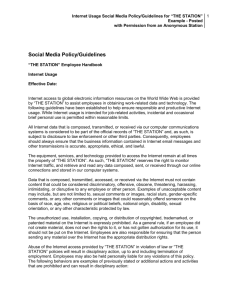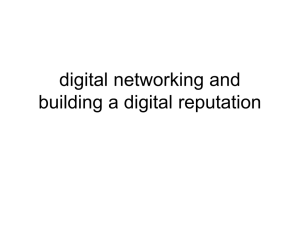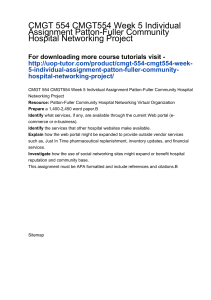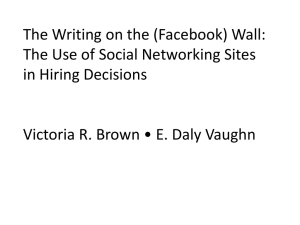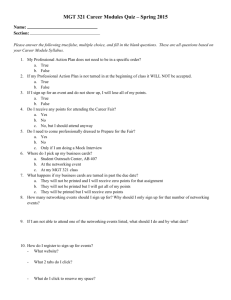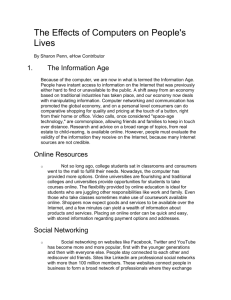Practice Resource Social Media and Social Networking Model Policy
advertisement
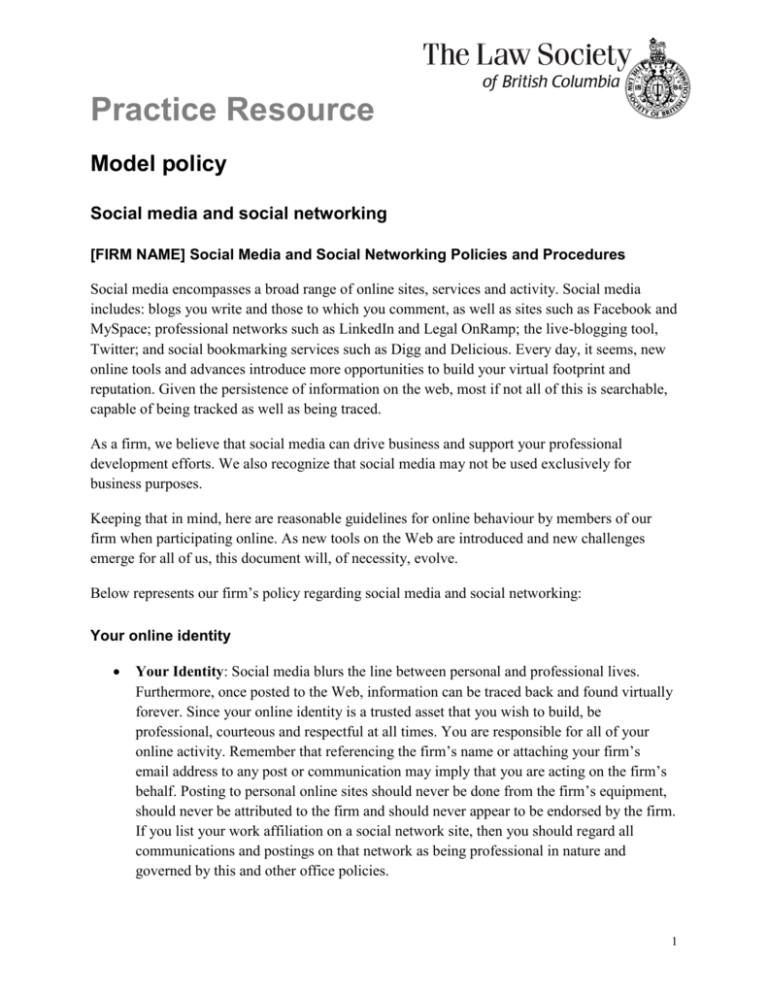
Practice Resource Model policy Social media and social networking [FIRM NAME] Social Media and Social Networking Policies and Procedures Social media encompasses a broad range of online sites, services and activity. Social media includes: blogs you write and those to which you comment, as well as sites such as Facebook and MySpace; professional networks such as LinkedIn and Legal OnRamp; the live-blogging tool, Twitter; and social bookmarking services such as Digg and Delicious. Every day, it seems, new online tools and advances introduce more opportunities to build your virtual footprint and reputation. Given the persistence of information on the web, most if not all of this is searchable, capable of being tracked as well as being traced. As a firm, we believe that social media can drive business and support your professional development efforts. We also recognize that social media may not be used exclusively for business purposes. Keeping that in mind, here are reasonable guidelines for online behaviour by members of our firm when participating online. As new tools on the Web are introduced and new challenges emerge for all of us, this document will, of necessity, evolve. Below represents our firm’s policy regarding social media and social networking: Your online identity Your Identity: Social media blurs the line between personal and professional lives. Furthermore, once posted to the Web, information can be traced back and found virtually forever. Since your online identity is a trusted asset that you wish to build, be professional, courteous and respectful at all times. You are responsible for all of your online activity. Remember that referencing the firm’s name or attaching your firm’s email address to any post or communication may imply that you are acting on the firm’s behalf. Posting to personal online sites should never be done from the firm’s equipment, should never be attributed to the firm and should never appear to be endorsed by the firm. If you list your work affiliation on a social network site, then you should regard all communications and postings on that network as being professional in nature and governed by this and other office policies. 1 Law Society of British Columbia Practice Resource: Model Policy – Social media and social networking Responsibility: You are responsible for what you post. When using a firm email address or firm assets to engage in any social media or professional social networking activity (for example LinkedIn or LegalOnRamp), the firm regards such actions as public, and lawyers and staff will be held fully responsible for any and all related activities. Online lives are ultimately linked and, whether or not you choose to mention the firm in your personal online networking activity, lawyers and staff must realize that others may make the association. Remember that, online at least, there is no clear line between your work life and your personal life. Always be honest and respectful in both capacities. Be transparent: When participating in any professional online community, disclose your identity as a lawyer and affiliation with the firm as well as your professional and/or personal interest. When posting to a professional blog, always use your name: never create an alias, and never be anonymous. Follow the rules in the firm’s [Employee Staff Manual]. These rules also apply to employee behaviour within social networking and other public online spaces. Recall that the Canons of Legal Ethics require that a lawyer’s conduct at all times should be characterized by candour and fairness. Be truthful: Never be false and misleading in your online credentials or posts. Lawyers and staff MUST maintain complete accuracy in all of their online bios and ensure there is no embellishment. For example: if a lawyer attends a CLE course at Harvard for a weekend and states “Harvard trained” in a bio, this is inaccurate and noncompliant with this policy. Obey all laws: Follow the terms and conditions of use that have been established for each social networking venue. Don’t post any information or conduct any online activity that may violate applicable provincial or federal laws or regulations. Do not use the words “expert” or “specialized” or “specialist” in any activities. In particular, follow the provisions of Chapter 14, “Marketing of Legal Services,” in the Professional Conduct Handbook. Creating and managing content Content: Always follow the Legal Profession Act, Law Society Rules and Professional Conduct Handbook when dealing with social media. Be direct, informative and brief in your professional online activities. Give credit: Give due credit to all authors, quoting and providing a citation and link where appropriate. Respect copyright on all materials. Avoid personal attacks, hostile communications and online disputes. Follow the firm’s policy guidelines. Be accurate: Always fact-check your posts and evaluate your contribution’s accuracy and truthfulness. Before posting any online material, ensure that the material is accurate, truthful, and without factual error and that you have the rights to post that material. 2 Law Society of British Columbia Practice Resource: Model Policy – Social media and social networking Correct errors promptly, apologizing when appropriate. Spell and grammar check everything. Remember that content never disappears entirely once it’s been posted. Always track back: When reposting or referencing a post on one of the firm's online sites, provide a link to the original post or story. Preserve goodwill: Do not engage in any blogging or posting that may harm or tarnish the image, reputation and/or goodwill of the firm and/or any of its lawyers or staff. Twitter policy: (from Jay Shepherd, lawyer at http://www.gruntledemployees.com/gruntled_employees/2009/03/a-tweetable-twitterpolicy.html): “Be professional, kind, discreet, authentic. Represent us well. Remember that you can’t control it once you hit ‘update.’” Leaving comments Avoid controversy: When posting to any blogs or social or professional networks, refrain from posting about controversial or potentially inflammatory subjects, including politics, sex, religion or any other non-business-related subjects. Keep the tone of your comments respectful and informative, never condescending or “loud.” Use sentence case format, not capital letters. Build your profile: When appropriate and where possible, provide a link to your LinkedIn or LegalOnRamp profile, or to supporting documents. This will help raise your Google results. Exercise caution: If in doubt, don’t! Confidentiality and privacy Respect confidentiality: Never disclose a client’s name or confidential information in a posting unless you have the client’s written permission as this has legal, ethical and professional ramifications even if it was unintentional. Never disclose any proprietary information. Be courteous at all times: Think twice before sharing a comment, post, picture or video about a client, lawyer or staff member on any sort of social media site or network, and certainly obtain their prior written approval before doing so. Remember that sharing this type of information, even unintentionally, can result in legal action against you, the firm, and/or the client. Be selective: There are many social networking sites out there. Be selective in the sites you visit and avoid those that do not provide you with adequate control over privacy settings, friends and followers and confidential information. Recall that posting or 3 Law Society of British Columbia Practice Resource: Model Policy – Social media and social networking emailing about a client or a case may, and in most cases will, be a breach of confidentiality. Be thoughtful about what, and where, you post. Potential conflicts and red flags Don’t get caught in flame wars: People say things on the Internet that they would never say in person. Accordingly, avoid personal attacks, online fights and hostile communications. If a blogger or any other online influencer posts a statement with which you disagree, voice your opinion, but do not escalate the conversation to a heated argument. Write reasonably, factually, and with good humour. Understand and credit the other person's point of view and avoid any communications that could result in personal, professional or credibility attacks. Seek approval: If a blogger or any other online participant posts an inaccurate, accusatory or negative comment about the firm or any firm clients, do not engage in the conversation. Refer the website and post to the managing partner and await further instructions. Legal advice: Never offer or appear to offer legal advice online. Individuals with the firm should not give legal advice or otherwise form solicitor-client relationships while using social media. Formation of these relationships must be done only through the firm's regular procedures to avoid conflicts and other ethical problems. Recommendations: Posting recommendations of colleagues is a tool of professional social networking sites. The recommendations and comments you post about other current and former firm lawyers can have consequences, even if you are making the recommendations personally and not on behalf of the firm. Therefore, we ask that you first clear with the managing partner all potential recommendations and comments for anyone who is or was associated with the firm prior to posting these to the web. Don't promote other brands with the firm's brand: Do not promote personal projects or endorse other brands, products, causes or opinions. Be sure to respect third-party copyrights. If a personal opinion must be posted, clearly state to all readers this does not represent the opinion of the firm and do not use your office email address. Journalists: Clear contact with any journalists with the managing partner before responding. Client testimonials: There can be potential dangers in using client testimonials, particularly if they are likely to create in the mind of the recipient or intended recipient an unjustified expectation about the results which a lawyer can achieve. If in doubt, refer any such reference to the managing partner prior to use and/or seek the opinion of the Practice Advice Department at the Law Society. 4 Law Society of British Columbia Practice Resource: Model Policy – Social media and social networking Disclaimer: Always use or incorporate the firm’s disclaimer when you communicate electronically. You do not wish to create the impression that you have entered into a solicitor- client relationship online. Building your virtual footprint and your network Build your reputation: Build a reputation of trust and transparency among your clients, media, firm members and the public. Use the power of social media to establish yourself as a credible, trusted and transparent legal professional. Guard your reputation and your integrity at all times while on the web. Do not post or link to any materials that are defamatory, harassing or indecent. Use appropriately: Don’t use your own personal online relationships or the firm’s network to influence polls, rankings or web traffic. Friends: Be cautious with your firm email and professional identification. In particular, do not “friend” anyone whom you either do not know and/or with whom you have not previously corresponded. The writer wishes to acknowledge the prior work of Jaffe, PR (www.jaffepr.com) whose white paper and draft Social Media Policy has been incorporated into this draft policy with their kind permission as well as the Social Media Policy of the law firm of Baker & Daniels (www.bakerdaniels.com), also used with permission. 5
